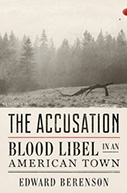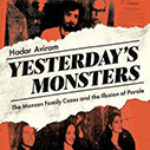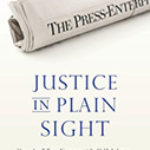The Accusation: Blood Libel In An American Town

Author: Edward Berenson
Publisher: New York, NY: W.W. Norton & Co., 2019. 271p.
Reviewer: Mark W. Podvia | September 2020
On September 22, 1928, Barbara Griffiths, a four-year-old girl, disappeared in the woods surrounding her Massena, New York, home. Initial efforts to find the young girl were unsuccessful.
After her disappearance, rumors began to circulate that Barbara had been a victim of blood libel—that she had been kidnapped by local Jews and ritualistically sacrificed for her blood. Although there was no evidence to support these rumors, Corporal Mickey McCann—the New York State Police officer investigating the disappearance—took them seriously. He quickly questioned two of Massena’s Jewish residents, placing them on his list of suspects. He and the town’s mayor, W. Gilbert Hawes, then summoned the local rabbi to the town hall where he was interrogated.
The author here examines the history of blood libel. Accusations of blood libel had appeared in Europe as early as 1144. In that year it was claimed that a young boy from the English town of Norwich named William had been tortured and hung on a cross by Norwich Jews. In 1235, it was claimed that Jews in England had crucified another young boy, Hugh of Lincoln. Although no evidence of a murder was ever found, King Henry III had 19 Jews executed for the crime.
False accusations of blood libel thereafter spread to continental Europe. In 1235 five Christian boys were killed in a fire in Fulda, Germany. Local Jews were accused of killing them; 34 Jews were tortured and killed in retaliation. Throughout the thirteenth, fourteen and fifteenth centuries Jews regularly faced accusations of ritual murder. Most of these claims were made around Passover, it being said that Jews needed Christian blood to make matzo. Christian revenge on Jews suspected of this crime could be terrible; in 1349 more than 2,000 Jews were burned alive in Strasbourg following a ritual murder claim.
As the Middle Ages closed, Jews were largely driven from Western Europe. Claims of blood libel spread to Central and Eastern Europe, where they did not subside until the eighteenth century. A new wave of claims of blood libel and responding pogroms began in Russia after Tsar Alexander II was assassinated by terrorists in 1881; among his assassins were several Jewish men. Similar anti-Jewish activities occurred in Germany, Austria-Hungry, Greece, and Romania. Anti-Semitism also saw a resurgence in Western Europe, capped by the Dreyfus affair when a Jewish officer in the French Army was falsely accused of selling military secrets to the Germans.
Until the disappearance of Barbara Griffiths, claims of blood libel were largely unheard of in the United States. However, her hometown of Massena was located along the United States border with Quebec; that Canadian province was then battling a rash of antisemitic activity.
This does not mean that Jews in the United States did not face persecution. The Ku Klux Klan, founded after the American Civil War, was primarily focused on American blacks, but was also anti-Catholic, anti-immigrant and anti-Jewish. The organization was largely suppressed in the early 1870s, but saw a resurgence in the early 1920s, then dying back following the 1928 Presidential campaign.
A far greater threat to American Jews came from anti-Semite automobile manufacturer Henry Ford. In 1918, Ford bought a newspaper, the Dearborn Independent. In 1920, he began running anti-Jewish propaganda in the paper. Losing a libel case, Ford was ultimately forced to publicly apologize to the Jewish community.
The disappearance of Barbara Griffiths occurred just as the 1928 Presidential election was getting underway. The election pitted Republican Herbert Hoover, a Protestant, against Al Smith, a Roman Catholic. Hoover’s underlings claimed that Smith’s religion made him a danger to the nation. While not directly linked to blood libel, the author takes time to review this extremely hostile campaign.
Thankfully, Barbara Griffiths—disoriented but unharmed—was found twenty-four hours after she had disappeared in a field one mile from her house. This was before any locals took retribution against members of Massena’s Jewish community, although based on history such retribution was a very real possibility. The question remains: what would have happened if she had not been found?
By the time Barbara Griffiths was located, the claim of blood libel in Massena had received national coverage, with newspaper accounts appearing in papers nationwide, including the New York Times, Washington Post, Boston Globe, Atlanta Constitution, and Los Angeles Times, and well as numerous small papers. After receiving pressure from New York’s Republican leadership, a letter of apology was issued by Massena’s mayor. The investigating trooper, Corporal McCann, also issued an apology and was disciplined by the state police.
The author of this excellent book, Edward Berenson, is from Massena, and he interviewed several locals including Barbara Griffiths. The book would make an interesting text for a civil rights course, and it certainly belongs in every academic and public library. It would also be an excellent book for evening or vacation reading.
Mark W. Podvia, is University Librarian, Head of Faculty Services, Curator of Rare Books and Archivist, George R. Farmer Law Library, West Virginia University College of Law, Morgantown, W.V


